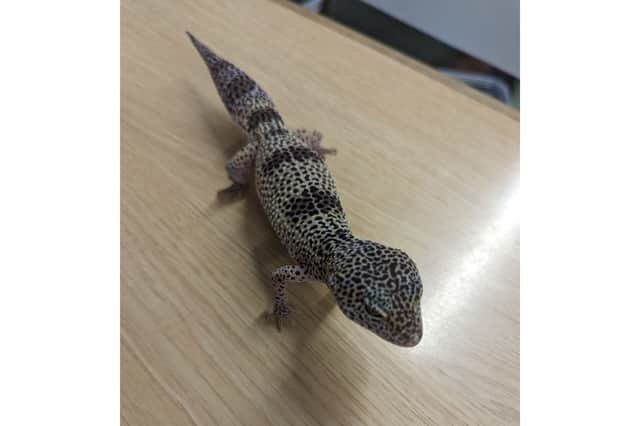McDonald's: RSPCA looks after gecko dubbed 'Bin Lizzy' found on bin outside North Finchley restaurant in London


Mystery surrounds how a leopard gecko came to be found on a bin outside a high street McDonalds.
The lizard was found on March 7 at around 1.30pm in North Finchley High Road, in north London. The finder put him in a box and called the RSPCA - then took the gecko home and kept him warm until an RSPCA officer could pick him up.
Advertisement
Hide AdAdvertisement
Hide AdAnimal Rescue Officer Lee Ricketts collected the gecko later that day. He said: “My first instinct was to go and check the bin to make sure the lizard had not been obviously abandoned, as there may have been a box with others inside the bin. After a search, nothing was found, so I collected the gecko from their house around the corner.
“He was very tame and appeared healthy, if not a little overweight. It's hard to tell if it's been abandoned by the bins or if it was an escaped pet as it was an unusually warm sunny day. He was very lucky to be contained and collected so quickly almost certainly wouldn't have made it through the night due to the cold. If anyone has lost a leopard gecko or knows who he may belong to, please call our inspectorate line on 0300 123 8018 quoting incident number 01232428.”
Named Bin Lizzy by RSPCA staff, he was immediately transferred to a private boarding facility who specialise in exotic animals and is being well cared for.
The RSPCA says that leopard geckos, like other reptiles, have specific needs including controlled temperature, lighting and humidity and specific dietary requirements, and it always urges people to properly research what is required in the care of their pet before taking them on.
Advertisement
Hide AdAdvertisement
Hide AdLee added: “We are finding that many people are unaware of how much of a commitment these animals are when they take them on, which we believe may be why we are rescuing hundreds of reptiles every year.
“Reptiles may look resilient and tough on the outside but they are actually completely reliant on their owners to provide the correct environment for the species, including heating and lighting, and an appropriate diet - which are essential to keep them healthy and allow them to carry out their natural behaviour. Without proper care they can suffer from serious diseases and, in severe cases or if left untreated, they can die. It is not always easy for an owner to tell when they are ill, fearful or suffering and by the time they are taken to a vet, if at all, it can be too late.”
Anyone who would like further information on how to care for leopard geckos should visit: https://www.rspca.org.uk/adviceandwelfare/pets/other/leopardgecko
Comment Guidelines
National World encourages reader discussion on our stories. User feedback, insights and back-and-forth exchanges add a rich layer of context to reporting. Please review our Community Guidelines before commenting.